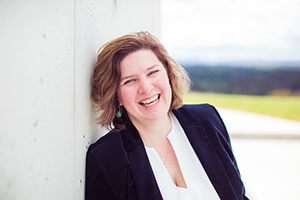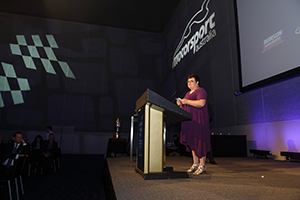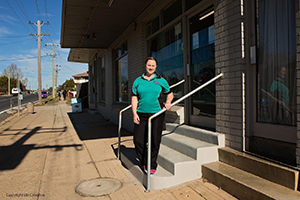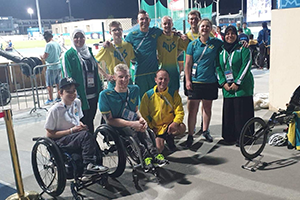 Photo credit: Tracy Lee Photography“I can text you to make a Massage appointment.” Lynda Leigh tells me when I ask her how my Massage Practice – Therapy Masters supports her and her disability. Lynda, a leading rally competitor, is moderately to profoundly deaf, usually wears expensive hearing aids and lip reads to communicate with those around her. But once she is in a darkened treatment room, lying face down on the treatment table, with her hearing aids out – the way the world interacts with her - needs to change.
Photo credit: Tracy Lee Photography“I can text you to make a Massage appointment.” Lynda Leigh tells me when I ask her how my Massage Practice – Therapy Masters supports her and her disability. Lynda, a leading rally competitor, is moderately to profoundly deaf, usually wears expensive hearing aids and lip reads to communicate with those around her. But once she is in a darkened treatment room, lying face down on the treatment table, with her hearing aids out – the way the world interacts with her - needs to change.
 Lynda Leigh at the 2019 Motorsport Australia Awards“Communication is more than words and when it comes to D/HoH (i.e. Deaf and Hard of Hearing) clients we rely heavily on visual cues. If we can’t see you, we can’t hear you as many D/HoH rely on speechreading with body language, and gestures, while some communicate via AUSLAN.” Explains Lynda. “At Therapy Masters having the consultation prior to the treatment, the therapist listening to my needs, plus dimmable lighting, no music, and somewhere for me to safely put my ‘ears’ while having the massage, allows me to feel reassured and relax into my treatment.”
Lynda Leigh at the 2019 Motorsport Australia Awards“Communication is more than words and when it comes to D/HoH (i.e. Deaf and Hard of Hearing) clients we rely heavily on visual cues. If we can’t see you, we can’t hear you as many D/HoH rely on speechreading with body language, and gestures, while some communicate via AUSLAN.” Explains Lynda. “At Therapy Masters having the consultation prior to the treatment, the therapist listening to my needs, plus dimmable lighting, no music, and somewhere for me to safely put my ‘ears’ while having the massage, allows me to feel reassured and relax into my treatment.”
Massage Therapy is a growing industry in Australia. There is predicted to be (approx.) a 20% employment growth from 19,900 massage therapists in 2018, to 23,900 in 2023. Along with this increase the Australian population is aging. The health needs of an aging population are also changing; with health needs becoming more complex. Data shows clients are becoming more reliant on complementary healthcare providers, especially massage therapists. This in turn means massage therapists and practice owners need to keep up with the changing needs of their communities. Source: https://nationalindustryinsights.aisc.net.au/industries/health/complementary-health
Over the 23 years I have been in the Massage Industry I have seen a growing need for adjusting our services to meet the changing needs of our clients. Understanding that there are clients in the community that will benefit from our expertise, but they are unable to access our services because of a gap in how we interact with them, opens up opportunities for our business to be more inclusive.
Thankfully, other Canberra complementary health practices are also providing more services and treatments that are inclusive of diverse client groups.
Mel Tuckwood from Mel’s Massage is Canberra’s leading mobile massage provider. Mel has seven massage therapists on her team, six working from their clinic at NextGen Lyneham, and one providing full time mobile treatments. “I would say 40% of the mobile appointments each week are for clients with some degree of disability – whether it’s stroke, chronic pain, decreased mobility, cerebral palsy, or other forms of disability.” Says Mel. “The biggest reason we provide mobile massage is to ensure that all clients have access to affordable massage treatments. We provide table and seated massages, and in/on bed treatments, as well as providing services to several disability houses. We also spend time speaking with carers to ensure our client information is up-to-date and we can adjust each treatment as needed.”
 Narelle Webb at Entire Physio Queanbeyan Image credit: Lib CreativeAt Entire Physio in Queanbeyan – a multidisciplinary practice, has invested in fitting out their internal space to ensure wheelchair and disability access. This includes sliding doors into treatment rooms, wider hallways and doors, and a low-level reception desk so wheelchair clients can communicate easily with the receptionist. Unfortunately, improvements to the building entrance have hit red tape.
Narelle Webb at Entire Physio Queanbeyan Image credit: Lib CreativeAt Entire Physio in Queanbeyan – a multidisciplinary practice, has invested in fitting out their internal space to ensure wheelchair and disability access. This includes sliding doors into treatment rooms, wider hallways and doors, and a low-level reception desk so wheelchair clients can communicate easily with the receptionist. Unfortunately, improvements to the building entrance have hit red tape.
“Three years ago, we petitioned the local council for a ramp to one of our front entryways. We applied for an Inclusion Grant but were unsuccessful because we are only tenants in our space, and don’t own the building.” Explains Narelle Webb, Principal at Entire Physio. “We’ve been making do by allowing clients access through our loading dock if they have a vehicle with an electric ramp or bringing out a moveable ramp to the front entrance if people’s vehicles aren’t equipped. We just wish that there were more grants available for health providers, leasing commercial premises. We know we would help more clients with mobility issues - if they had easier access to our building.”
While Mitchell based sports performance facility Myogen treat a number of para-athletes. They have a purpose-built treatment room, with wide access around the massage table for easy transfer from wheelchair to table. Electric massage tables also make the transfer safe and comfortable for their clients. Myogen also have designated disabled carparking out the front of their premises.
 Jessica Clark (2nd from right) with Australian Para-athletes at the World Para-athletics Dubai November 2019“A number of our clients come to us through the ACT Academy of Sport (ACTAS) and the Australian Institute of Sport (AIS).” Says Jessica Clark, Principal and Co-Owner of Myogen. “With COVID the AIS closed down their services and we moved to flexible service arrangements for our para-athletes. Normally I would treat them at the AIS, then for a time they were coming to the clinic. Now I’m back treating at the AIS athletics track.”
Jessica Clark (2nd from right) with Australian Para-athletes at the World Para-athletics Dubai November 2019“A number of our clients come to us through the ACT Academy of Sport (ACTAS) and the Australian Institute of Sport (AIS).” Says Jessica Clark, Principal and Co-Owner of Myogen. “With COVID the AIS closed down their services and we moved to flexible service arrangements for our para-athletes. Normally I would treat them at the AIS, then for a time they were coming to the clinic. Now I’m back treating at the AIS athletics track.”
With the impacts of the summer fires, bushfire smoke, the January hailstorm and COVID, the Canberra massage industry are going to treat more and more people who have a unique set of experiences and health needs. It is only when we can see and connect with the individual in front of us, that we can provide them with the best treatment and care. It is with connection, knowledge, assessment and experience that we tailor our expertise to meet a client’s specific health needs.
Given that Massage Therapy is the most popular complementary healthcare modality sought in Australia, it makes sense for massage practitioners to focus on building client-centric businesses. I look forward to seeing more Canberra massage practices following the lead of Mel’s Massage, Entire Physio and Myogen and embracing client-centric business models.
Lisa LaMaitre is an award-winning business creative, health expert, teacher and communicator. Lisa is the Creator of Canberra Wise Women, a platform for sharing positivity and inspiration. With 23+ years of health industry experience, she is the Founder and Principal Practitioner of Therapy Masters. Therapy Masters is one of Canberra’s leading Remedial Massage practices. Lisa also shares her expertise to Global Sisters, the Australian Massage Industry, ACT Court Dog program, and ANU Science, Health and Medicine Alumni.


